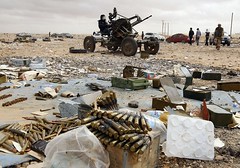 Image by شبكة برق | B.R.Q via Flickr
Image by شبكة برق | B.R.Q via FlickrLast month I got some disturbing news. A group of gay Ugandans were trapped in Libya.
One described being gay and black African as "a double crime here". As a number of news outlets have reported, African migrant workers have suffered abuse by the forces fighting Muammar Gaddafi.
The gay Africans eventually got back home safely but for thousands more the triumph of the National Transitional Council (NTC) and its revolutionary fighters remains a cause for grave concern.
The International Detention Coalition has reported on the harassment, mass arrest and detention of African migrants across Libya. Between one and two million African migrant workers were living in Libya.
Human Rights Watch has reported that thousands of black Libyans and African migrants have been held on suspicion of having fought as mercenaries for Gaddafi.
Refugees International's Matt Pennington has just returned from Libya. He says that the NTC and its allies have failed to protect the most vulnerable in Libya, including sub-Saharan migrants and minority Libyans.
Pennington says that many of the NTC’s supporters still see black Libyans and migrants as allies of Gaddafi – their perceptions skewed by reports of Tawerghan fighters’ involvement in the siege on Misrata, and sub-Saharan mercenaries brought in to quell the initial uprising.
Black Libyans forced to flee Gaddafi-allied towns have been abused, harassed, and detained by rebel forces and the NTC has done virtually nothing to stop these abuses.
Two weeks ago, on the outskirts of Sirte, Pennington met with families fleeing the fighting in this final Gaddafi stronghold.
At a camp in Sidi Bilal, a port just outside Tripoli, more than 600 migrants from sub-Saharan Africa are effectively stranded, face repeated attacks, extortion, harassment, and arbitrary arrests by Libyan gangs and have been left to fend for themselves by Libyan authorities. (See video)
The majority of migrants Pennington spoke to now refuse to leave the port because of the violence and intimidation they face outside.
So far, the UN World Food Programme has delivered one food drop to the imperiled migrants, while the UN Refugee Agency and the International Organization for Migration have been attempting to negotiate safe relocation for those who want to stay and repatriation for those who want to return home.
Not all is hopeless. The gay Ugandan said that recently, one of his Ugandan friends was badly beaten and left for death - he was saved because a few of their Libyan friends came to his rescue.
Pennington appeared on Al Jazeera English to discuss abuses by NTC fighters, the need for protection of vulnerable groups, and human rights after the death of Muammar Gaddafi.








 Join our page
Join our page


0 comments:
Post a Comment